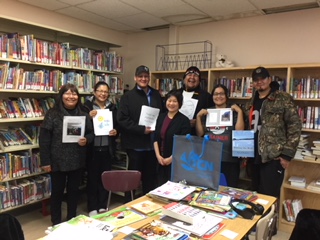New member Janice Seto from Canada has just sent us this fascinating story about her work with indigenous communities. We are always keen to share the work of members with others across the association and to the wider community development community. So do please send us your story.
You can contact Janice at the address below:
The Write Way to CED: An Overview By Janice Seto

“I got a cheque from Amazon! A hundred and nine US dollars in royalties!”
Unscripted, this announcement by one of the Community Economic Development (CED) students is the culmination of months working on the CED book project ‘Write Way to CED’ in Pukatawagan, Manitoba in northern Canada. It is in this semi-remote economically-challenged community of approximately 4,000 members of the Mathias Colomb Cree Nation that the regional centre of the University College of the North (UCN) delivers the college-level diploma over the course of three academic years. Flipped-classroom in a different sense, the UCN reversed students relocating to attend CED classes at its main campuses, and instead it is the instructor who moves into this Indigenous reserve in the north western section of the province.
From this in situ perspective, the instructor, Janice Seto, whose work has taken her from the cold treeless Arctic to the dry hot Arabian desert to the hot humid tropics, designs course projects to maximize her guiding principle: ‘Create to Relate’. As much as possible, each assessment in the program increases each student’s capacity to create something of meaning that furthermore relates to Pukatawagan’s development as community.
As the instructor herself has self-published over the years, her particular ‘Create to Relate’ initiative takes the form of the CED book project ‘The Write Way to CED’. In the foundation course of the CED program, Business Communications, with its standard grammar-focused syllabus. (phase 1), each student was tasked to write a coffee-table book on Pukatawagan, on any topic of their choice using a variety of photographs. Applying the grammar of the text, the students also wrote captions for each image. In phase 2, the students who had hitherto primarily been consumers of internet content (video gaming, surfing for information, for example) were taught how to obtain their own ISBN account through Library and Archives Canada government body and use Google suite (in particular email, Drive, word processing, search) as creators of content. The majority of the time was spent at phase 3 in preparing to publish onto the Amazon CreateSpace platform. In using SEO techniques, these CED books are available for purchase worldwide in ebook and print format.
In subsequent courses, the CED cohort used the ‘skin in the game’ of their own product to apply lessons such as how to test market their books and to promote them in the new media as well as the traditional book launch and book reading. Their second books, bilingual English-Cree children’s books, are all the better for the vigorous feedback from elementary students in Pukatawagan. Stakeholder buy-in such as this has encouraged these nascent CED professionals to continue their CED efforts to create and diffuse locally-created meaning.
More incentivizing are the book royalties from Amazon that accrue to CED students maximizing their new book creation and publishing skillset. Janice Seto addresses the limits of text-book based entrepreneurship courses by instead apply theory to student-created products. If CED students become entrepreneurial and model a can-do spirit, they can break themselves and their families out of the poverty of a welfare-dependency mindset often pervading indigenous communities.
A cheque from Amazon is not just a cheque. Welfare cheques do not get the entire cohort cheering. A cheque from Amazon represents more than solely a dollar figure of their book royalties. Amazon cheques are evidence their hard work pays dividends. It is a start, a breakthrough at the individual level. According to Janice Seto, “Community Economic Development happens only when the individual is developing. There is a storyteller in everyone, there is a Micro-Entrepreneur (ME) in everyone.”

*** A more thorough look at the ‘Write Way to CED’ will be available in an upcoming issue of the IACD’s Practice Insights magazine. It is also posted on the new Indigenous CD page on the Global Community Development Exchange.***
